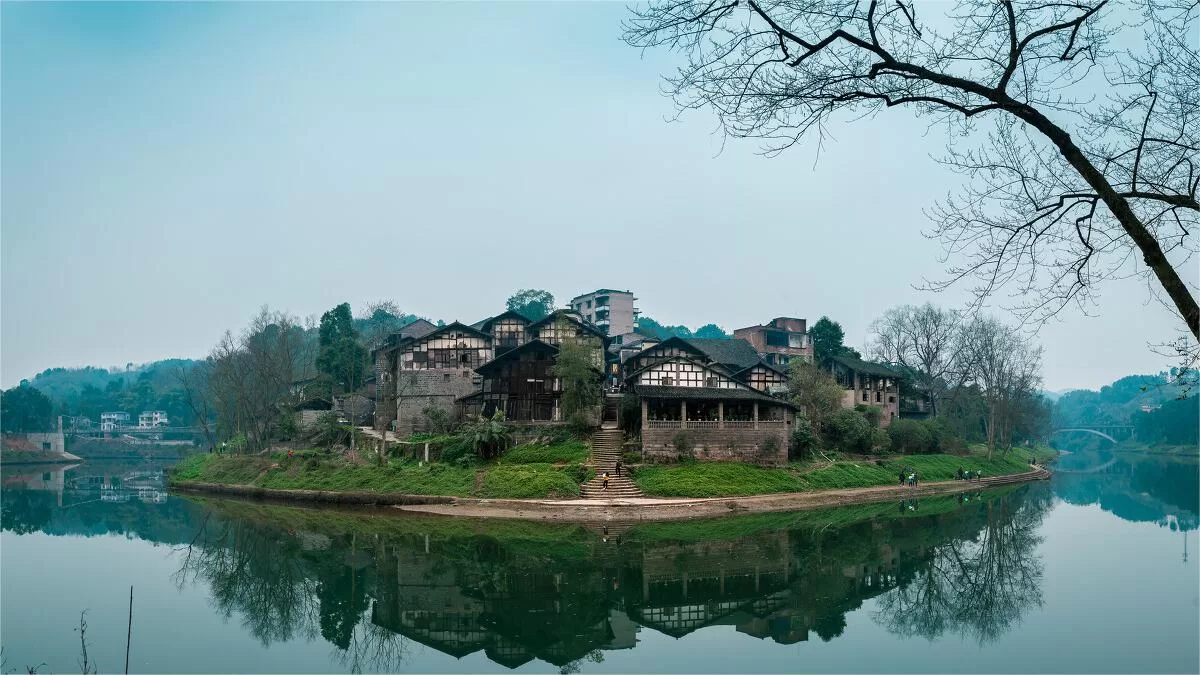Located at the crossroads of Chongqing, Sichuan, and Guizhou provinces, Tanghe Ancient Town (塘河古镇), named after its river, has been a bustling hub for transportation and trade for centuries. During the Ming and Qing dynasties, it thrived with a continuous flow of boats and horses, and bustling merchants created a prosperous scene. This historical town covers an area of 2.8 hectares and boasts over 15,000 square meters of ancient buildings, each representing different architectural styles from various periods since the Ming and Qing dynasties.
The town’s streets are built into the hillside and wind their way up from the riverside docks in a stepped fashion. The main street, stretching approximately 600 meters, connects two smaller streets, Hengjiesi and Miaoxiangzi, with three imposing gatehouses along the way. As you ascend the street, you’ll encounter buildings constructed with blue stone foundations, brick and wood walls, intricate eaves and arches, beautifully carved beams and columns, all creating an enchanting and harmonious atmosphere.
Table of Contents
- Basic Information
- Location and Transportation
- Highlights of Tanghe Ancient Town
- Other Attractions in Jiangjin District
Basic Information
| Estimated Length of Tour | Half a day |
| Ticket Price | Free |
| Opening Hours | 24 hours a day |
| Telephone Number | 0086-023-47346488 |
Location and Transportation
Tanghe Ancient Town is situated in the southwestern border area of Chongqing’s Jiangjin District, where the provinces of Chongqing and Sichuan converge. To the northeast, it shares boundaries with Baisha Town and Yongxing Town, while to the southwest, it is adjacent to the Sichuan province’s Hejiang County.
To get to Tanghe Ancient Town from Chongqing, you can take a bus from one of the major bus stations like Caiyuanba, Chenjiaping, or Longtousi to Jiangjin Bus Station. From there, you can transfer to a local bus or other local transportation to reach Tanghe Ancient Town. However, please keep in mind that Tanghe Ancient Town is quite a distance from the city center (approximately 110 kilometers), so the most convenient options are either self-driving or joining a one-day tour for a hassle-free visit.
Highlights of Tanghe Ancient Town
Ancient Architecture

Wangye Temple, built during the Ming Dynasty, still stands today in its original form. The main hall and theater have upturned eaves with painted walls, and the inscriptions of pine, bamboo, plum, and seal script on the theater’s pediment evoke the past’s remarkable elegance. Across the street from Wangye Temple is Longmen Pavilion, where boatmen in Tanghe used to gather for leisure. At the highest point in the town, you’ll find the grand and majestic Qingyuan Palace, built in the 13th year of Guangxu during the Qing Dynasty. Unfortunately, only the old palace walls remain. Zhujiayang Mansion, constructed along the street, is a unique blend of Western and Chinese architectural techniques. It seamlessly incorporates Western architectural culture into the rich tapestry of Chinese architecture.
Dragon Boat Races

Every year during the Dragon Boat Festival, people from various regions come together in Tanghe Ancient Town to hold dragon boat races in honor of Qu Yuan, seeking safe journeys and good weather. Over time, the tradition of dragon boat racing has become a cultural heritage, cherished by the local population, and one of the most beloved and widely practiced mass sports in the area. In recent years, Tanghe Ancient Town has hosted several dragon boat races involving the three provinces of Sichuan, Chongqing, and Guizhou, making a significant impact in the region.
Film and Television Location

Tanghe Ancient Town, with its splendid ancient architectural culture, unadorned folk customs, and picturesque surroundings, has become a popular filming location for numerous movies and TV dramas. Over 80 productions, including “Red Memories,” “Paper Dreams,” “City of Mist,” “Hometown,” “Mother, Mother,” “Women of Luolong Town,” and “Happiness Photo Studio,” have been filmed here, showcasing the town’s captivating scenery and rich history on the silver screen.





Tanghe Ancient Town, with low popularity, is located on the must-pass road from Baisha to Songdi. Despite the limited time, following the principle of “never miss out on passing by”, I decided to take a stroll around. I’m glad I didn’t miss it! The ancient town is not big, the main street is a winding mountain road extending from the pier to the mountaintop, with old houses lining both sides. The town has been featured in many movies, with posters… Read more »